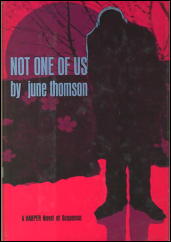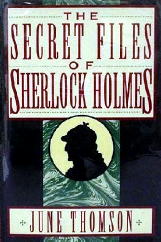Wed 2 Dec 2009
JUNE THOMSON – Not One of Us. Harper & Row, US, hardcover, 1971. UK edition: Constable, hc, 1972.

This is an early Thomson, one which displays well her ability to write a quiet, underplayed story of murder, while at the same time delving into the character of those in major roles. John Smith is a “man of mystery,” a retiring, educated Englishman who lives alone in a cottage on the edge of a village.
The villagers are suspicious of anyone who is reclusive, and Smith will not play the good fellow with them. He is happy to live alone with his dog. Then the body of a fifteen year old girl from a neighboring village is found in a wood I not far from Smith’s cottage. She has been strangled, and the autopsy shows that she is six months pregnant.
Inspector Finch suspects Smith, and yet feels that he and Smith have something in common. Gradually Smith’s background is revealed, as the villagers grow more and more hostile. There is subtlety in Thomson’s handling of character.
Finch is changed by his encounter with Smith; so is Smith. We may hope that the people of the village also are changed, but we’re given no reason to believe so.
Editorial Comment: Inspector Finch was renamed Inspector Rudd for most of June Thomson’s books when they appeared in the US — there being another Inspector Finch who appeared in Margaret Erskine‘s books. This being the first in the series, it’s interesting to see that Finch remained Finch in this one.

There are now twenty books in the Finch/Rudd series, the most recent being Going Home (2006). As the author is now 79, it is possible that this will also be the last.
Over the past several years, June Thomson has also been writing collections of Sherlock Holmes pastiches, the first of these being The Secret Files of Sherlock Holmes (1990). There are now six books of these, the first few of which I own but (alas) have yet to read.
Whenever a discussion of current and latter-day authors who write in the Golden Age tradition breaks out, for some reason June Thomson’s name seldom comes up, and I think it should.
December 3rd, 2009 at 8:27 am
I’ve always meant to try Thomson’s Insp. Finch/Rudd books as I associate her in my mind with Dorothy Simpson, another middle of the road British semi-procedural writer whose books I’ve really enjoyed reading. (Her detective is Insp. Luke Thanet, by the way.)
Yet, for some reason I’ve never read them. I have read some of her Holmes stories.
December 3rd, 2009 at 11:47 am
I agree. Dorothy Simpson is an author much like June Thompson in a lot of ways — including being not very well recognized for a long list of solidly constructed detective stories.
December 9th, 2009 at 4:41 pm
[…] Comment: Previously reviewed by Maryell Cleary on this blog was June Thomson’s Not One of Us, the first book in the […]
October 2nd, 2019 at 3:19 pm
I read the Inspector Rudd books as they came out and enjoyed them immensely. Wishing they were available as ebooks now, I am trying to collect the series, as these are some of the very few stories I would like to re-read. Thomson rules!